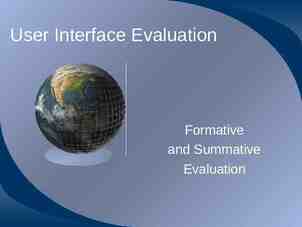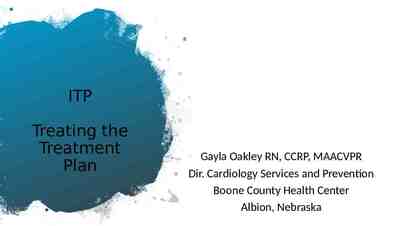Lync Server 2013 | Part 2 Architecture and Deployment Changes
42 Slides7.89 MB

Lync Server 2013 Part 2 Architecture and Deployment Changes Richard Oertle Subject Matter Expert www.NetComLearning.com NetCom’s Average Instructor Rating: 8.7/9 www.netcomlearning.com

Webinar Overview Monitoring Improvements Topology Changes Operating System and Processor Support Changes New Disaster Recovery and High Availability Features New Conferencing Features New Features for External User Access New Archiving Features New Persistent Chat Server Features New Conferencing Changes Enterprise Voice Changes

Monitoring Improvements Geo-availability monitoring Monitor end-user scenarios from different geographical regions Uses multiple System Center Operations Manager (SCOM) agents, inside or outside the data center, to run synthetic transactions at regular intervals. End-to-end scenario availability and other reports Using SCOM data warehouse and reporting engine Rich error reporting for synthetic transaction failures

Robust Server/Client Environment Communicating and Collaborating using connecting in Lync voice and video in Lync Find, connect, and communicate with Microsoft Office users Connect and communicate with external users Manage Lync IM & presence and persistent chat features Lifelike video experience with multi-view video and higher resolutions Web conferencing Voice conferencing Office integration Lync is available virtually anytime, anywhere on almost any device Lync is available on a variety of mobile devices Lync is available on the web Lync is available on room systems Lync as a Hosted Service

Virtual Desktop Infrastructure The storage and execution of a desktop workload (operating system, applications, and data) is centralized on a virtual machine in the data center Remote Desktop Client Presentation of the UI is managed via a remote desktop protocol (such as Remote Desktop Protocol (RDP) or Independent Computing Architecture (ICA)) to client devices Remote Desktop Servers

Topology Changes Server Role Consolidation IPv6 Support Lync Hybrid Deployment Office Web Apps Server Director Role Changes Enterprise Voice Topology Changes

IPv6 Support IPv4 depletion has caused enterprises to start planning for transition to IPv6 seriously Exponential growth of mobile devices has forced carriers to start issuing IPv6 addresses Goals for this release : Lync scenarios work well in a dual-stack IPv6/IPv4 environment IPv6–capable: If IPv4 is disabled from the network, Lync should continue to work for all the basic functionalities Recommend converting entire deployment to Lync Server 2013 before enabling IPv6, for simplifying interoperability

Office Web Apps Server Topology 1: Office Web Apps Server is installed on-premises and in the same network zone as Lync Server 2013 Perimeter network

Back End High Availability HA/DR Feature Support Matrix Feature HA DR Feature HA DR Peer-to-peer (all modalities) YES YES Planning Tool YES YES Presence YES YES YES YES Conferencing (all modalities) YES YES Public Switched Telephone Network (PSTN) Voice UCWA YES YES YES YES Archiving YES YES Conferencing Auto Application (CAA) / Personal Virtual Assistant (PVA) / GVA Call Detail Record (CDR) /Quality of Experience (QoE) YES NO YES NO federation YES YES Public IM Connectivity (PIC) routing YES YES Response Group Service (RGS) / Call Park Server (CPS) / Client Access server (CAS) /Enhanced 911 (E911) Unified Contact Store (UCS) YES YES Call Admission Control (CAC) YES NO Topology Builder YES YES YES YES Lync Server Control Panel YES YES Extensible Messaging and Presence Protocol (XMPP)

New Conferencing Features Office Web Apps Server Multi-View Video

Office Web Apps Server Using the new WAC-based Office Presentation Service, present your PPT presentation in a Lync meeting Advance through slides and animations or bring up thumbnails for quick navigation Annotate and telepoint on the presentation View speaker notes as you present Adjust meeting options to control whether meeting participants can navigate through slides on their own or annotate presentations Synchronously play embedded multimedia files in PowerPoint decks (New!) Support for Windows Media Video (WMV), H.264, and non-native content (e.g., You Tube Video) up to 20 megabytes (MBs) Meeting participants are automatically muted during video playback Presenter can play, stop, and seek to a specific location Multimedia will not be recorded at full fidelity Interoperates seamlessly with Lync 2010 clients

Multi-View Video

New Features for External User Access Extensible Messaging and Presence Protocol Changes Mobility Support for Mobile Clients

Extensible Messaging and Presence Protocol Changes New for External Users: Extensible Messaging and Presence Protocol (XMPP) Changes XMPP Proxy and Gateway XMPP Federation is optional Add contacts from XMPP-based partners for IM and Presence Mobility Support for Mobile Clients Using Applie iOS, Android, Windows Phone, or Nokia mobile devices Send and receive IM, view contacts, viewing Presence Use Voice features: click to join, call via work, single number reach, voice mail, missed call notivication.

Mobility Support for Mobile Clients Contacts Presence Meetings environment, click to join audio conference Voice Point to Point (P2P) IM, group conversations Audio Conferencing My status, contact presence Instant Messaging (IM) Photo contact list, contact card, enterprise search, distribution groups Single number reach, call forwarding setting, voice mail Support for on-premises and Microsoft Office 365 iOS

New Archiving Features Collocation of Archiving Role Exchange Integration Whiteboards and Poll Archiving

Collocation of Archiving Role Lync 15 Server Mailbox Hold Policy – Archiving Policy Get Mailbox Hold Policy Lync Server Front End Exchange 15 Server AD Session Transcripts Session Transcripts Web Conference Archives Lync Server Front End Lync Server Front End Session Transcripts (Optional) Archiving Db for archiving users without Exchange 15 mailboxes Exchange Store Mailbox Server What is Archived In-meeting instant messages (IMs) Meeting join/leave activities with roles PowerPoint file sharing activities Handouts Whiteboard (new) Poll (new) High Availability (new) No more archiving server role Fails over with Front End server In flight session archives replicated to multiple Front End servers SQL mirroring support Exchange Integration (new) Single archiving policy (mailbox hold) Archives stored in Exchange user mailboxes Discovery and Preservation across Exchange, Lync, and SharePoint Disaster recovery On-Premises and cloud Requires Exchange Server 2013

Exchange Integration Exchange Integration (new) Single archiving policy (mailbox hold) Archives stored in Lync 15 Server Mailbox Hold Policy – Archiving Policy Exchange user mailboxes Get Mailbox Hold Policy Discovery and Preservation across Exchange, Lync, and SharePoint Disaster recovery On-Premises and cloud Lync Server Front End Exchange 15 Server AD Session Transcripts Session Transcripts Web Conference Archives Lync Server Front End Requires Exchange Server 2013 Lync Server Front End Session Transcripts (Optional) Archiving Db for archiving users without Exchange 15 mailboxes Mailbox Server Exchange Store

Whiteboards and Poll Archiving What is Archived In-meeting instant messages (IMs) Meeting join/leave activities with roles PowerPoint file sharing activities Handouts Whiteboard (new) Poll (new) Lync 15 Server Mailbox Hold Policy – Archiving Policy Get Mailbox Hold Policy Lync Server Front End Exchange 15 Server AD Session Transcripts Session Transcripts Web Conference Archives Lync Server Front End Lync Server Front End Session Transcripts (Optional) Archiving Db for archiving users without Exchange 15 mailboxes Mailbox Server Exchange Store

New Persistent Chat Server Features Key Persistent Chat Topology Changes Persistent Chat Administration and Management Changes Persistent Chat Client Integration Persistent Chat User Role and RBAC Changes Fully Integrated Server Role

Key Persistent Chat Topology Changes Persistent Chat Server is a first-class server role in Lync Server topology Multiple Persistent Chat Server pools to help comply with data privacy regulations Disaster recovery improvements and stretched pools Simplified administration model Topology Builder, Lync Server Control Panel, Microsoft Windows PowerShell , Health and Monitoring Large rooms Up to 15K concurrent endpoints/room Server SDK for room management Mirrored SQL Active Directory Registration & Presence (SIP) Persistent Chat (XCCOS) Room Management (Web) Registration, Presence (SIP) Persistent Chat (XCCOS) Lync Edge IM & P Lync FE Pool 1 Reverse Proxy Datacenter 1 Lync admin Lync PC Pool 1 Persistent Chat (XCCOS)

Persistent Chat User Role and RBAC Changes Three key items to manage: Categories Add-ins Simplified single level with simple definition of scope (ethical boundaries) comprising both allow and deny lists Enhances the conversation experience Rooms Discuss ongoing content Simplification of category and room properties and inheritance

New Conferencing Changes Scheduling Changes Collaboration and Audio Control Changes

Scheduling Changes

Creating Online Meetings from Outlook Web App

Joining Meetings from Outlook Web App

Collaboration and Audio Control Changes Multiparty video and people focus make Lync more personal Office integration makes Lync more productive Virtual Desktop Infrastructure (VDI) and web client (with A/V) extend the reach of Lync
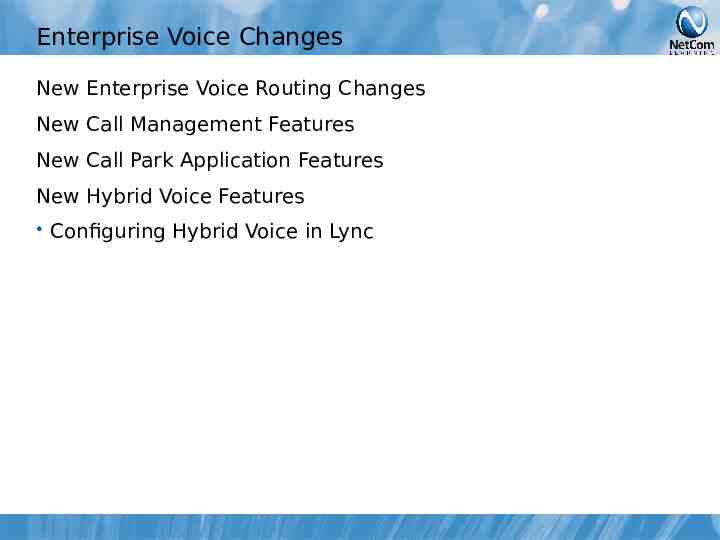
Enterprise Voice Changes New Enterprise Voice Routing Changes New Call Management Features New Call Park Application Features New Hybrid Voice Features Configuring Hybrid Voice in Lync

New Enterprise Voice Routing Changes Lync introduces new enhancements to voice routing, including: Call Forwarding – You can forward calls to other phones and client devices. Enabled by default Simultaneous Ringing – Incoming calls ring on an additional phone (for example, a mobile phone) or other endpoint devices. Enabled by default Manager/Delegate Simultaneous Ringing – Delegates can setup simultaneous ringing to their mobile devices for incoming calls to their manager Voicemail Escape – When simultaneous ringing is configured, and the user’s cellphone is turned off, out of battery or out of range, Lync Server 2013 can determine that an incoming call was immediately routed to voicemail, and hang up that endpoint so that the call can continue to ring to endpoints of the user Caller ID presentation – Provides the administrator the flexibility to modify the format of the calling party’s phone number Conference Dial-Out for users not enabled for enterprise voice – Users that are not enabled for Enterprise Voice are now able to do conferencing dialout based on the organizer’s voice policy

New Call Management Features Lync New Call Management features: NewResponseGroup Application Features Route and queue incoming calls to designated persons for special purposes New Announcement Application Features Configure how to handle phone calls made to numbers that are valid but not assigned to a user or common area Transfer the calls to a predetermined destination, have them answered with a recorded announcement, or both New Call Park Application Features Put a call on hold and then retrieve it later from any phone
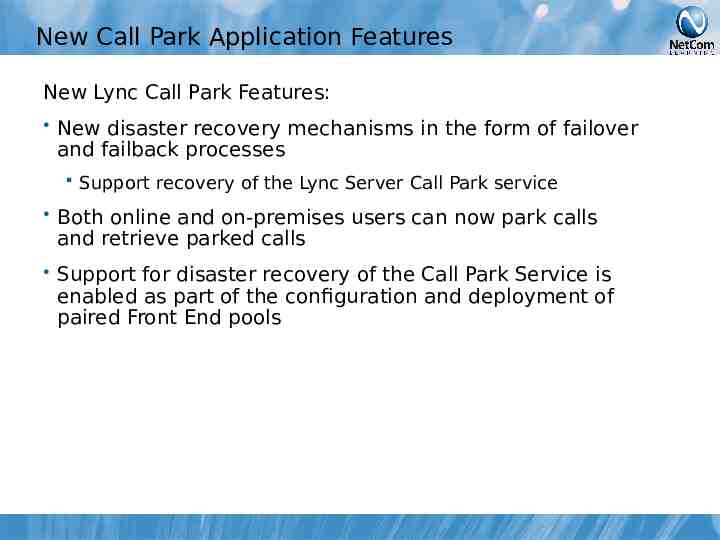
New Call Park Application Features New Lync Call Park Features: New disaster recovery mechanisms in the form of failover and failback processes Support recovery of the Lync Server Call Park service Both online and on-premises users can now park calls and retrieve parked calls Support for disaster recovery of the Call Park Service is enabled as part of the configuration and deployment of paired Front End pools
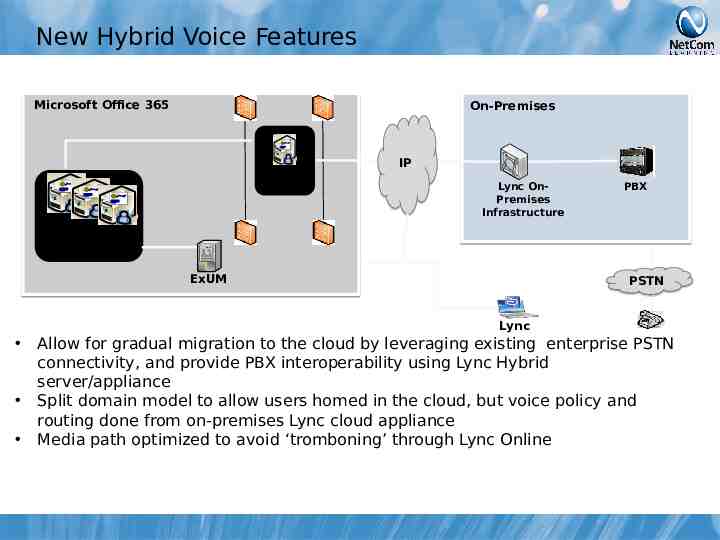
New Hybrid Voice Features Microsoft Office 365 On-Premises Edge Server IP Lync OnPremises Infrastructure PBX Lync Server ExUM PSTN Lync Allow for gradual migration to the cloud by leveraging existing enterprise PSTN connectivity, and provide PBX interoperability using Lync Hybrid server/appliance Split domain model to allow users homed in the cloud, but voice policy and routing done from on-premises Lync cloud appliance Media path optimized to avoid ‘tromboning’ through Lync Online
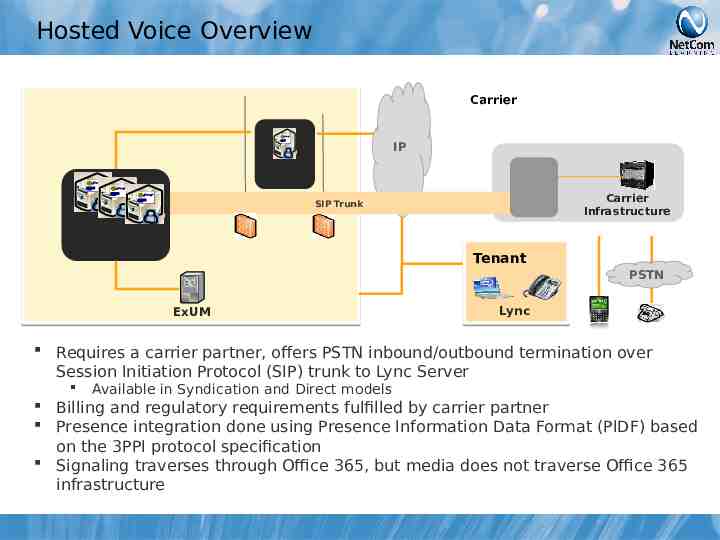
Hosted Voice Overview Carrier IP Edge Server SIP Trunk Lync Server SBC Carrier Infrastructure Tenant PSTN ExUM Lync Requires a carrier partner, offers PSTN inbound/outbound termination over Session Initiation Protocol (SIP) trunk to Lync Server Available in Syndication and Direct models Billing and regulatory requirements fulfilled by carrier partner Presence integration done using Presence Information Data Format (PIDF) based on the 3PPI protocol specification Signaling traverses through Office 365, but media does not traverse Office 365 infrastructure
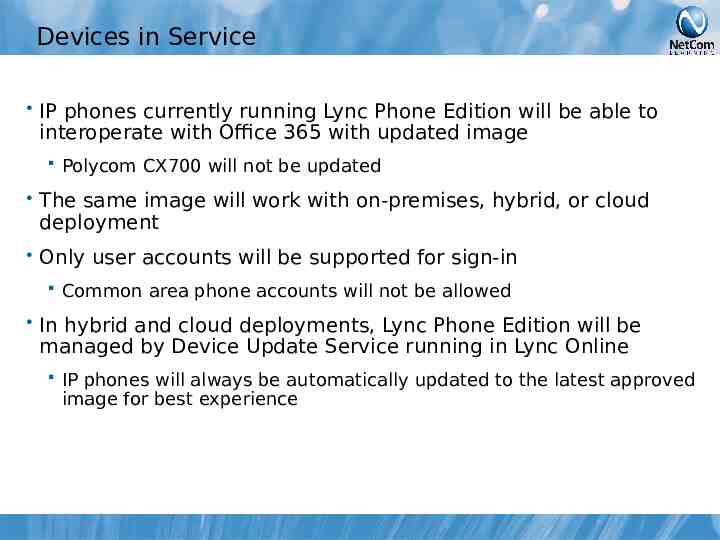
Devices in Service IP phones currently running Lync Phone Edition will be able to interoperate with Office 365 with updated image Polycom CX700 will not be updated The same image will work with on-premises, hybrid, or cloud deployment Only user accounts will be supported for sign-in Common area phone accounts will not be allowed In hybrid and cloud deployments, Lync Phone Edition will be managed by Device Update Service running in Lync Online IP phones will always be automatically updated to the latest approved image for best experience
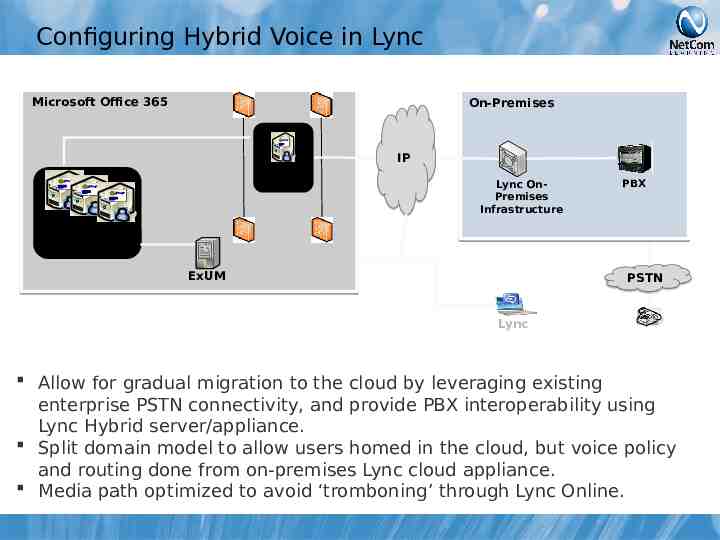
Configuring Hybrid Voice in Lync Microsoft Office 365 On-Premises IP Edge Server Lync OnPremises Infrastructure PBX Lync Server ExUM PSTN Lync Allow for gradual migration to the cloud by leveraging existing enterprise PSTN connectivity, and provide PBX interoperability using Lync Hybrid server/appliance. Split domain model to allow users homed in the cloud, but voice policy and routing done from on-premises Lync cloud appliance. Media path optimized to avoid ‘tromboning’ through Lync Online.
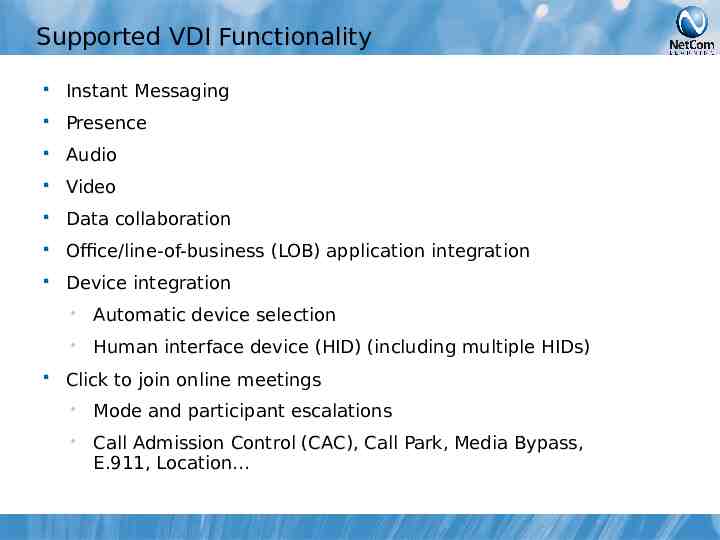
Supported VDI Functionality Instant Messaging Presence Audio Video Data collaboration Office/line-of-business (LOB) application integration Device integration Automatic device selection Human interface device (HID) (including multiple HIDs) Click to join online meetings Mode and participant escalations Call Admission Control (CAC), Call Park, Media Bypass, E.911, Location
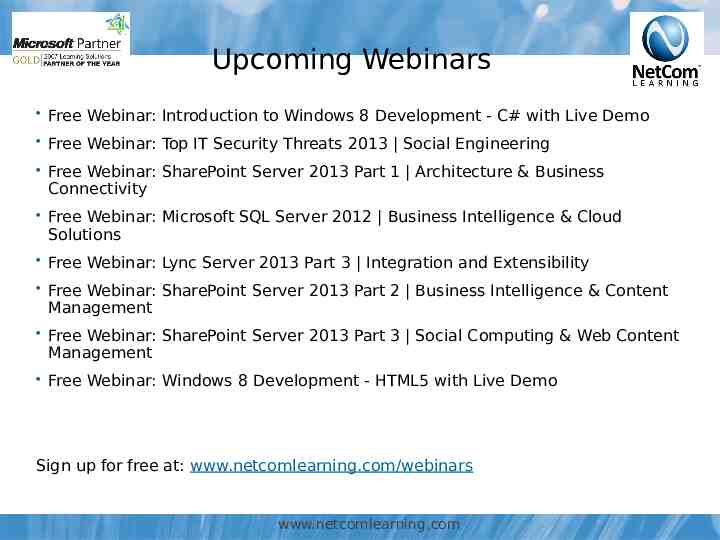
Upcoming Webinars Free Webinar: Introduction to Windows 8 Development - C# with Live Demo Free Webinar: Top IT Security Threats 2013 Social Engineering Free Webinar: SharePoint Server 2013 Part 1 Architecture & Business Connectivity Free Webinar: Microsoft SQL Server 2012 Business Intelligence & Cloud Solutions Free Webinar: Lync Server 2013 Part 3 Integration and Extensibility Free Webinar: SharePoint Server 2013 Part 2 Business Intelligence & Content Management Free Webinar: SharePoint Server 2013 Part 3 Social Computing & Web Content Management Free Webinar: Windows 8 Development - HTML5 with Live Demo Sign up for free at: www.netcomlearning.com/webinars www.netcomlearning.com
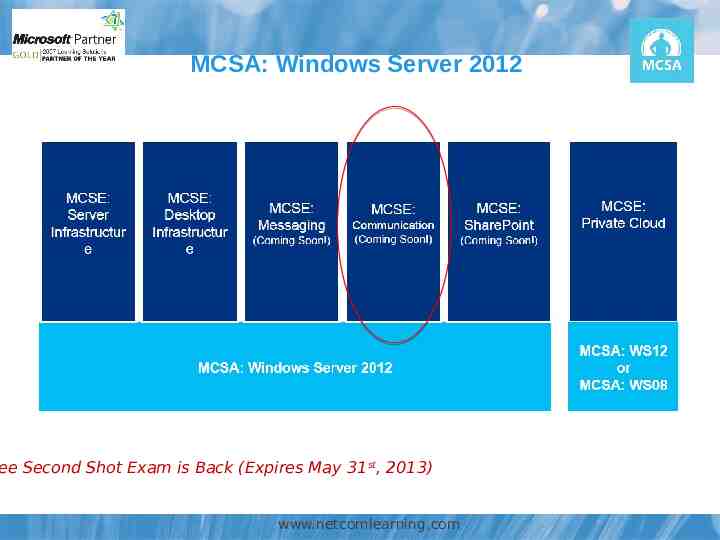
MCSA: Windows Server 2012 ee Second Shot Exam is Back (Expires May 31 st, 2013) www.netcomlearning.com
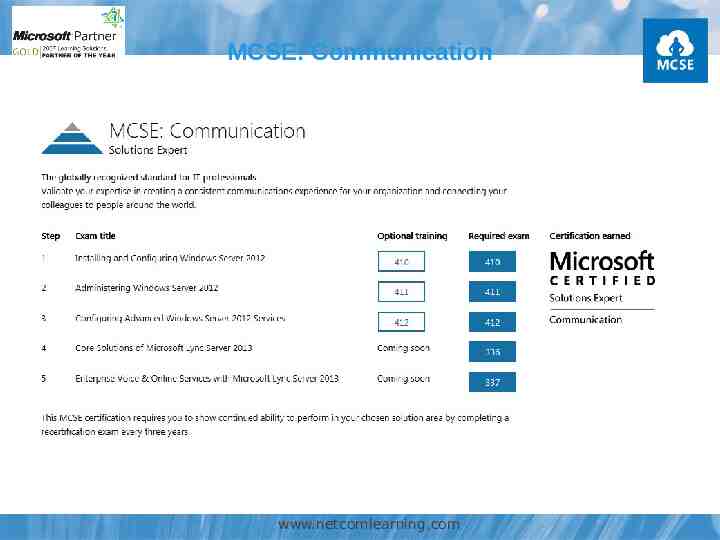
MCSE: Communication www.netcomlearning.com
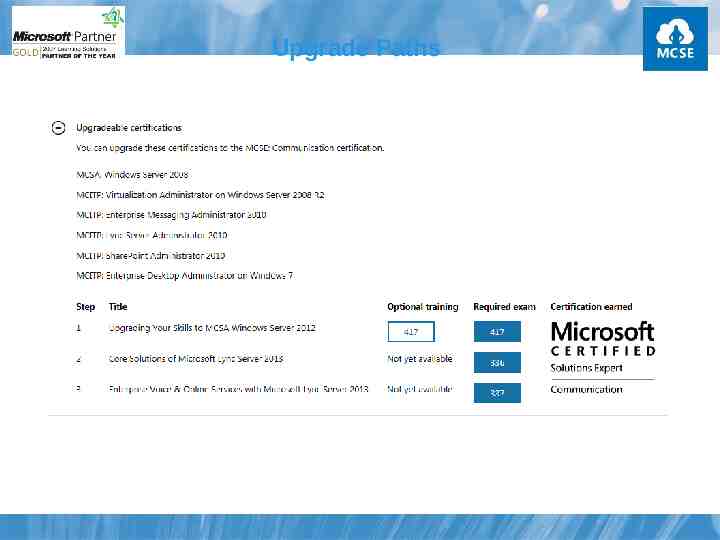
Upgrade Paths
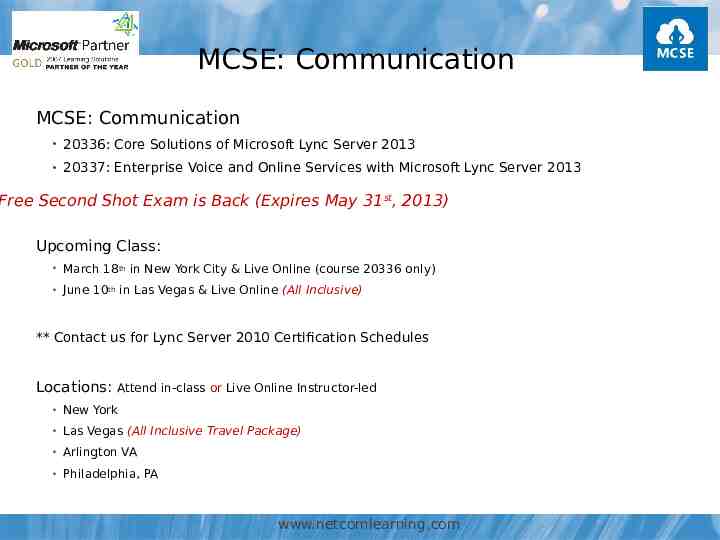
MCSE: Communication MCSE: Communication 20336: Core Solutions of Microsoft Lync Server 2013 20337: Enterprise Voice and Online Services with Microsoft Lync Server 2013 Free Second Shot Exam is Back (Expires May 31 st, 2013) Upcoming Class: March 18th in New York City & Live Online (course 20336 only) June 10th in Las Vegas & Live Online (All Inclusive) ** Contact us for Lync Server 2010 Certification Schedules Locations: Attend in-class or Live Online Instructor-led New York Las Vegas (All Inclusive Travel Package) Arlington VA Philadelphia, PA www.netcomlearning.com
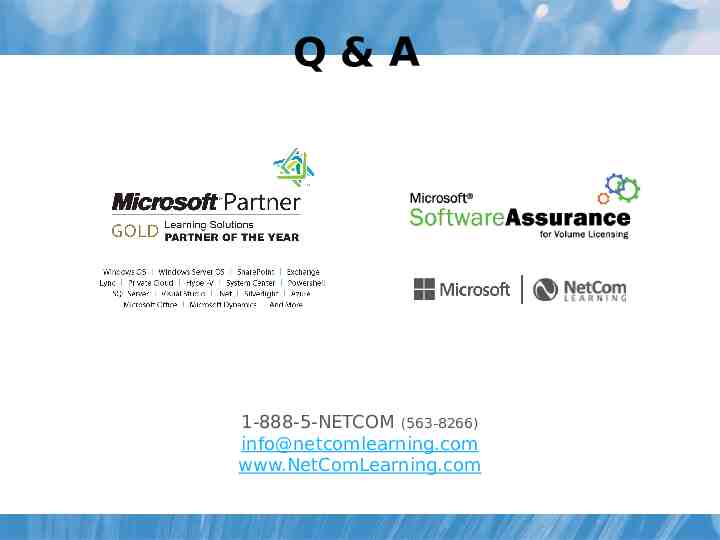
Q&A 1-888-5-NETCOM (563-8266) [email protected] www.NetComLearning.com


